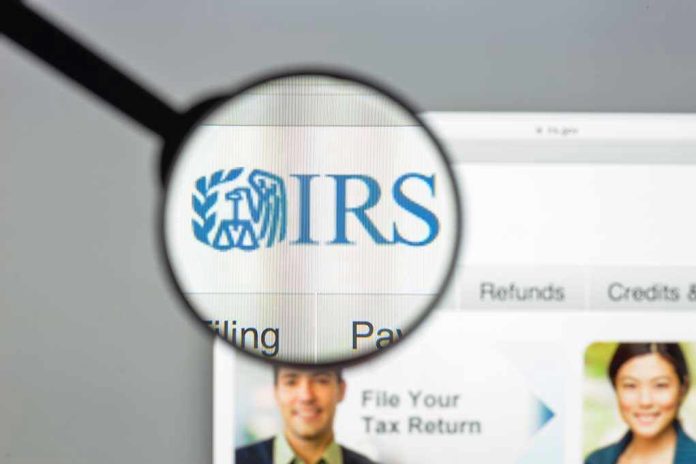
If the IRS’s new criminal chief can keep politics out of tax probes, he might just rewrite the rules of trust in American law enforcement.
Story Overview
- Gary Shapley, a whistleblower famed for his role in the Hunter Biden investigation, now serves as Deputy Chief of IRS Criminal Investigation.
- Shapley promises that evidence, not politics, will drive IRS criminal tax probes—even in the most politically charged cases.
- The IRS’s independence faces unprecedented scrutiny amid rising polarization and memories of past controversies.
- Shapley oversees over 2,000 special agents and global operations, with his leadership poised to impact public trust and agency culture.
IRS Leadership Faces the Political Crossroads
Gary Shapley’s rise to Deputy Chief of IRS Criminal Investigation on March 19, 2025, marked a dramatic inflection point for the agency’s future. The IRS-CI, tasked with cracking down on tax fraud, money laundering, and international financial crime, has traditionally held itself apart from politics. Yet, recent years have thrust the division into the limelight, as its probes have intersected with high-profile political figures and controversies that test the boundaries of impartial enforcement. Shapley’s appointment couldn’t have arrived at a more contentious time, with polarized public debate swirling and congressional eyes fixed on every IRS move.
Incoming IRS criminal chief says evidence, not politics, will guide tax probes https://t.co/bC7HZeHL4Q
— Policy Wire (@policy_wire) November 11, 2025
Shapley’s reputation as a whistleblower in the Hunter Biden case set the stage for his leadership philosophy. His direct involvement and subsequent public statements exposed how IRS criminal investigations can become entangled with national politics. In November 2025, Shapley told CBS News he would resist any and all political pressure—even hypothetical demands from a future administration to target rivals. His message: only the facts, only the evidence, guide the IRS’s hand. This explicit stand resonates with Americans weary of government overreach and longing for agencies that serve the law, not partisan agendas.
IRS-CI’s Mandate and Modernization
IRS Criminal Investigation operates as the law enforcement arm of the IRS, responsible for rooting out financial crime at home and abroad. Shapley now oversees 20 field offices and 14 foreign posts, commanding a force of over 2,000 special agents. The division’s current strategy is focused on modernization and international collaboration, embracing data-driven methods to keep pace with increasingly sophisticated financial threats. In this climate, the IRS’s independence becomes both a shield and a vulnerability, as critics and supporters alike scrutinize every case for signs of bias.
Shapley’s predecessor, Guy Ficco, praised his expertise in international crime and complex investigations. The endorsement is more than ceremonial; it signals a commitment to technical excellence and operational integrity. The IRS-CI’s push for global reach and advanced enforcement shifts the spotlight onto how leadership decisions affect not only American taxpayers but also international financial institutions and professionals advising clients on compliance. As Shapley takes the reins, his stance on political neutrality gains heightened significance for legal and accounting circles tracking enforcement trends.
Whistleblower Legacy Shapes New Norms
Shapley’s whistleblowing in the Hunter Biden investigation carved a unique position for him in public discourse. By exposing alleged irregularities and advocating for procedural transparency, he became both a lightning rod and a symbol of institutional conscience. His new role tests whether a whistleblower can reshape an agency’s culture from within, promoting accountability without succumbing to the pressures that once prompted his disclosures. This dynamic creates an open question for observers: can the IRS-CI, under Shapley, insulate itself from political influence more effectively than in the past?
Shapley’s interviews highlight his refusal to be swayed by the volatile winds of Washington. He stated he would not “bow to pressure if the Trump administration calls for investigations into political enemies.” Such firm public commitments are rare among senior law enforcement officials, especially in agencies repeatedly accused of political targeting—from the 2013 scrutiny of conservative nonprofits to the recurring controversies around high-profile tax probes. Whether Shapley can maintain this posture in practice, rather than just rhetoric, remains the central drama unfolding at the heart of the IRS.
Ripple Effects: Trust, Enforcement, and Public Perception
The stakes extend far beyond IRS headquarters. Shapley’s evidence-first approach promises to impact the agency’s internal culture, the behavior of special agents, and the expectations of taxpayers. Short-term effects include heightened media and congressional scrutiny of ongoing investigations, particularly those with political undertones. In the long-term, Shapley’s tenure could set precedents for transparency, nonpartisan enforcement, and the restoration of public trust in the IRS’s independence.
Economic impacts are also in play. Stronger, impartial enforcement may deter tax evasion and boost government revenues. Socially, the public’s confidence in fair application of tax laws could rise or fall, depending on perceived integrity in high-profile cases. Political consequences are inevitable; as both parties watch for any sign of bias, the IRS’s every move could become a flashpoint. Legal and accounting professionals, meanwhile, will adjust their advice and strategies in response to shifts in enforcement priorities, while international actors brace for increased scrutiny.
Sources:
Gary Shapley Named Deputy Chief of IRS Criminal Investigation
IRS-CI Names Gary Shapley as Deputy Chief
IRS Criminal Investigation (Wikipedia)
Incoming IRS Criminal Chief Vows to Keep Politics Out of Tax Investigations
CBS Interview: IRS Whistleblower Gary Shapley
IRS Whistleblower Gary Shapley: IRS Criminal Chief, Trump’s Enemies



